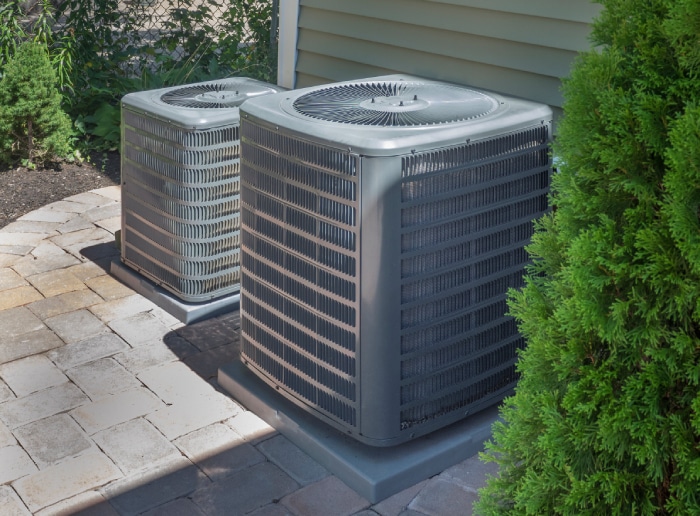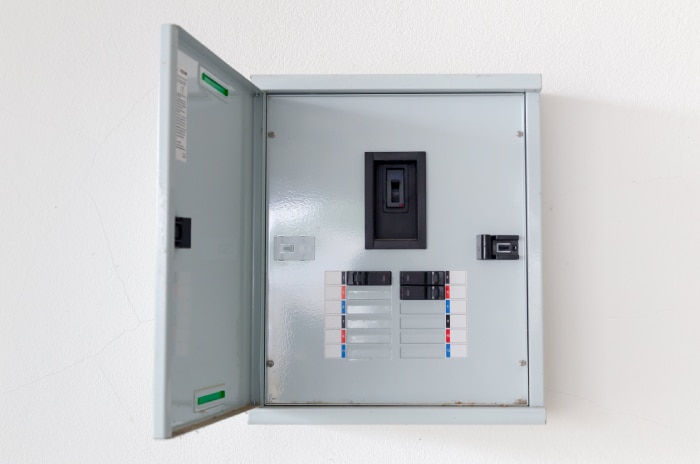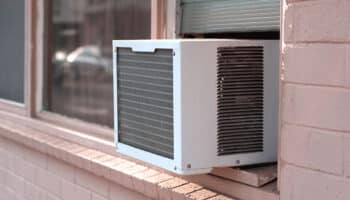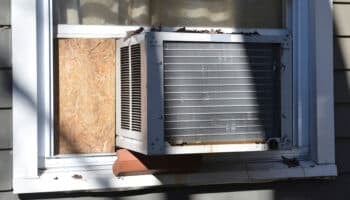We've independently reviewed this article to make sure it's as accurate as we can make it.
To find out more about our article creation and review process, check out our editorial guidelines.
Wondering what to do about a window air conditioner that’s tripped your breaker?
I’ll discuss several reasons that could be the cause and how to handle them. And point out when you should worry about it. Because in some cases I would say there isn’t too much of a concern. In other cases, you may need to take action.
Read on, and I’ll explain the difference.
Was It a Random Event, or Does Your Breaker Trip Often?
First of all, there may be times when you shouldn’t be overly concerned over a tripping event.
The fact is circuit breakers trip. I would say most, if not all, homeowners have had to trek down to the basement to reset a breaker on the main service panel.
If you’ve had your window air conditioner—or portable, for that matter—running on a specific outlet for a significant period of time, and you suddenly had a random trip, you probably shouldn’t panic.
But pay attention and do a little detective work. What else was going on when the breaker tripped? Did someone plug in a rarely used appliance? Or did nothing change at all? Whatever the case, file that info away, just in case it happens again.
If it doesn’t, just assume it was one of those things and move on.
But what if your breaker is constantly tripping?
If this is your scenario, do not reengage the breaker. Every breaker is rated to carry a specified number of amps—or current. So if you have your air conditioner on a breaker rated at 15 amps and you’ve gone over that, your breaker trips.
Which is exactly what it was designed to do. It’s a safety feature. To save you from an electrical fire will make your house a whole lot hotter. It could go up in smoke along with your air conditioner.
Instead of resetting the breaker, find out why it’s constantly tripping.
Let’s walk through a few possible reasons.
Reasons Air Conditioners Could Constantly Trip Your Breaker
There is a good chance the source of your problem is the air conditioner itself. Because something could be making it overheat and draw more power than it should—and more current than your breaker can handle—your breaker sends a warning message by tripping.
Here are several possible reasons for an air conditioner to overheat. And note that the following could apply to a window air conditioner or a central air unit.
1. Dirty Condenser Coil
A tripped breaker simply means that something was pulling too many amps than the breaker could allow.
When it comes to air conditioners, the number one reason that amps increase is that the condenser coils are full of dirt and debris. This stops air properly flowing over them, can cause condensation on the dirt buildup, and things can start to freeze.
In the end this increases the demand on your unit, until eventually it goes beyond the amp breaking point.

The condenser coil carries your system’s coolant. Hot air is absorbed and removed from your home and travels outside. As it passes through your outdoor unit, a fan blows air over the coils and the heat is released.
Solution. Clean your coils.
Regardless of your air conditioner type (portable, window, central, ductless) – they all share this common issue.
The number one tip to preventing an air conditioner tripping a breaker is to keep those coils clean.
For window units, this typically just means taking off the back plate and gently brushing downwards on the coils. Find out more in our window AC cleaning guide.
If you have the type that can be cleaned, you can do so with a mild detergent and water. Just be sure to rinse it well.
42 There is a Short in the Motor
All summer long, your air conditioner runs. But motors weren’t built to run indefinitely and if it runs too hot, it can deteriorate the insulation around the wires. Which can lead to a short.
Shorts can lead to electrical fires, so this is where the breaker steps in and trips.
Solution: If you have access, you can do a visual check for burnt-looking wires. But this is a job for an HVAC professional or electrician.
Is a Tripping Breaker Dangerous?
Maybe. Especially if it’s tripped often.
As mentioned above, most of us have had to deal with a blown fuse or tripped breaker. And we reset or replace and carry on. But it’s a good idea to monitor that.

Meaning if something randomly trips, you reset, and if it never happens again you can probably let it slide. But if you remember that you just went through this scenario on the last day, week, whatever, you should investigate.
Because a tripping circuit breaker could be dangerous.
| What Causes a Breaker to Trip? | |
| Overloaded Circuit | This is when you have more lights or appliances on a circuit than it can handle. |
| Short Circuit | This is when a hot wire and a neutral wire come in contact in one of your electrical outlets. This causes a spike in current and can start a fire. |
| Ground Fault Surges | This happens when a hot wire touches the ground wire. Again, this causes a spike in current and can start a fire. |
| ARC Fault | This is another form of breaker. An AFCI or arc-fault circuit interrupter. These sense power fluctuations when a spark happens between two connections. |
As you can probably tell from the above, if your breaker is tripping due to an overloaded circuit, the solution is to simply unplug an appliance.
The other three are potentially dangerous so you should call an electrician.
Conclusion
If you have a window air conditioner that’s tripping a breaker you may just need to move it to another spot. As the table above shows, the AC could be overloading the circuit.
Or it could be something to do with how your air conditioner is running. If you haven’t been keeping up with maintenance, it could be overheating. This causes a rise in current, and your breaker trips to keep you safe.
So check the following:
- Dirty air filter
- Dirty condenser coil
- Refrigerant leak
- A short in the motor
The first two you can handle yourself, but for the others, you really should hire a pro.
Hopefully, we’ve been able to answer your questions. Why not check out our related articles below? Maybe we can help with something else.







